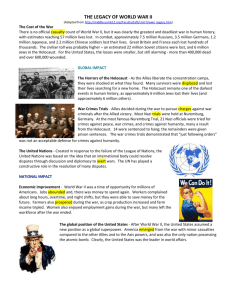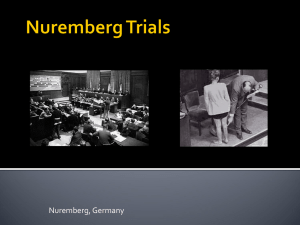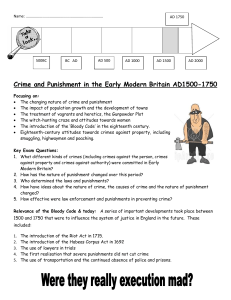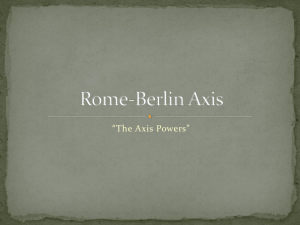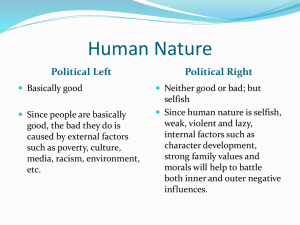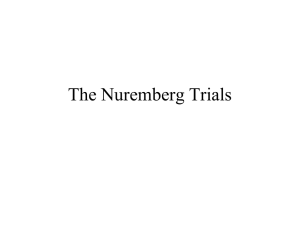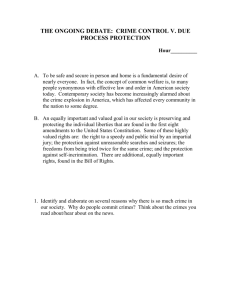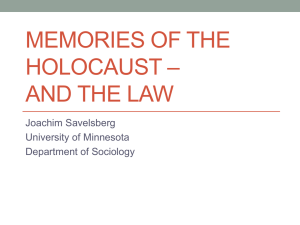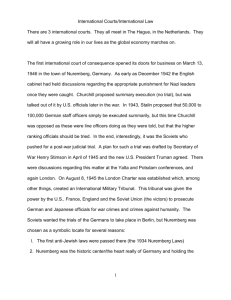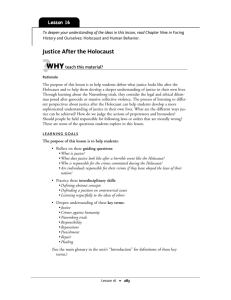The Axis
advertisement
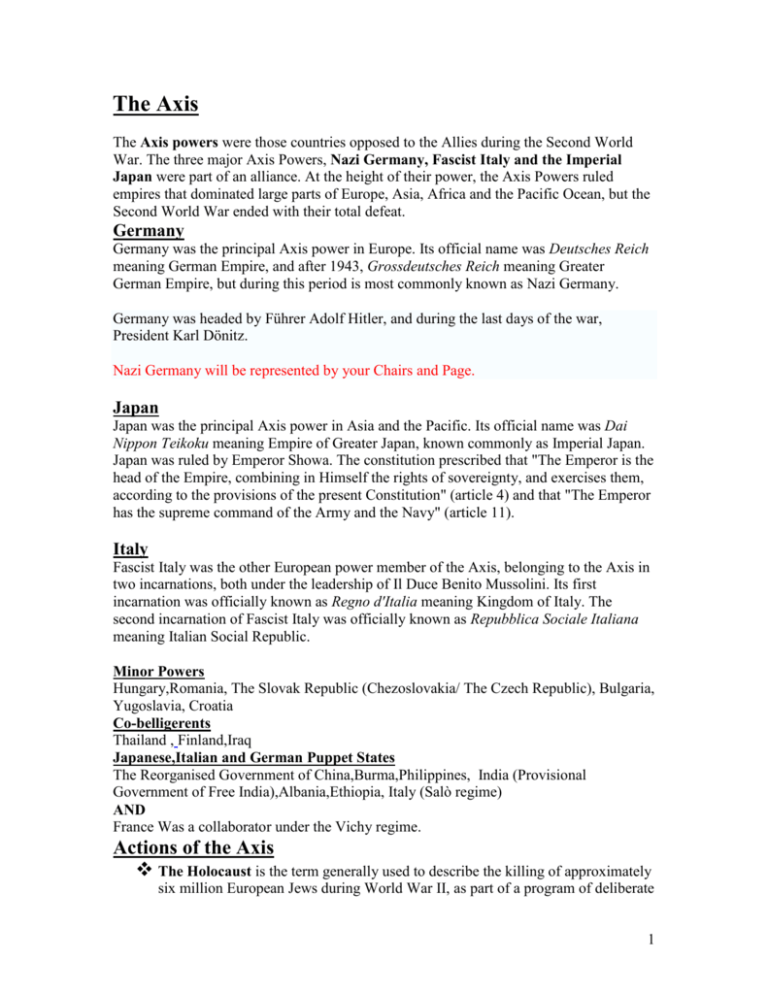
The Axis The Axis powers were those countries opposed to the Allies during the Second World War. The three major Axis Powers, Nazi Germany, Fascist Italy and the Imperial Japan were part of an alliance. At the height of their power, the Axis Powers ruled empires that dominated large parts of Europe, Asia, Africa and the Pacific Ocean, but the Second World War ended with their total defeat. Germany Germany was the principal Axis power in Europe. Its official name was Deutsches Reich meaning German Empire, and after 1943, Grossdeutsches Reich meaning Greater German Empire, but during this period is most commonly known as Nazi Germany. Germany was headed by Führer Adolf Hitler, and during the last days of the war, President Karl Dönitz. Nazi Germany will be represented by your Chairs and Page. Japan Japan was the principal Axis power in Asia and the Pacific. Its official name was Dai Nippon Teikoku meaning Empire of Greater Japan, known commonly as Imperial Japan. Japan was ruled by Emperor Showa. The constitution prescribed that "The Emperor is the head of the Empire, combining in Himself the rights of sovereignty, and exercises them, according to the provisions of the present Constitution" (article 4) and that "The Emperor has the supreme command of the Army and the Navy" (article 11). Italy Fascist Italy was the other European power member of the Axis, belonging to the Axis in two incarnations, both under the leadership of Il Duce Benito Mussolini. Its first incarnation was officially known as Regno d'Italia meaning Kingdom of Italy. The second incarnation of Fascist Italy was officially known as Repubblica Sociale Italiana meaning Italian Social Republic. Minor Powers Hungary,Romania, The Slovak Republic (Chezoslovakia/ The Czech Republic), Bulgaria, Yugoslavia, Croatia Co-belligerents Thailand , Finland,Iraq Japanese,Italian and German Puppet States The Reorganised Government of China,Burma,Philippines, India (Provisional Government of Free India),Albania,Ethiopia, Italy (Salò regime) AND France Was a collaborator under the Vichy regime. Actions of the Axis The Holocaust is the term generally used to describe the killing of approximately six million European Jews during World War II, as part of a program of deliberate 1 extermination planned and executed by the Nazi regime in Germany led by Adolf Hitler. Invasion of Poland Le Paradis massacre, May 1940, British soldiers of the Royal Norfolk Regiment, captured by the SS and subsequently murdered Malmedy massacre, December 1944, United States POWs captured by Kampfgruppe Peiper were murdered outside of Malmedy, Belgium. The annihilation of the Czech city of Lidice The Holocaust of the Jews, the Action T-4 killing of the disabled and the Porajomas of the Gypsys. Unrestricted submarine warfare against merchant shipping. In China alone, during 1937-45, approximately 3.9 million Chinese were killed, mostly civilians as a direct result of the Japanese invasion Nanjing Massacre of 1937-38-the Japanese Army massacred as many as 260,000 civilians and prisoners of war Experiments on humans and biological warfare VS. THE ALLIED FORCES The Allies of World War II were the countries officially opposed to the Axis Powers during the Second World War. During the war they were often called the United Nations, although that name now usually refers to the international organization they established after the war. Within the ranks of the Allied powers, the Union of Soviet Socialist Republics (Soviet Union), the United States (U.S.) and United Kingdom (UK) were known as "The Big Three." U.S. President Franklin D. Roosevelt referred to the Big Three and China as the "Four Policemen". France, in 1939-40 and after its liberation in 1944, was also once again considered a major Allied power. The immediate Causes of World War II are generally held to be the German invasion of Poland, and the Japanese attacks on China, the United States, and the British and Dutch colonies. In each of these cases, the attacks were the result of a decision made by ruling elites in Germany and Japan. World War II started after these aggressive actions were met with an official declaration of war or armed resistance. This Committee – The Nurembug Trials The Nuremberg Trials were a series of trials most notable for the prosecution of prominent members of the political, military and economic leadership of Nazi Germany. The trials were held in the city of Nuremberg, Germany, from 1945 to 1949, at the Nuremberg Palace of Justice. The first and best known of these trials was the Trial of the Major War Criminals Before the International Military Tribunal (IMT), which tried 2 24 of the most important captured leaders of Nazi Germany. It was held from November 20, 1945 to October 1, 1946. This is our trial. We may also be discussing some of the Twelve subsequent Trials like the Doctor’s Trial (which involves some of the Doctors from Nazi Germany) When researching the Doctors’ trial please be aware that many of the crimes disscussed are especiallly grusome. Research at your own risk. The indictments of the Nazis are: 1. Participation in a common plan or conspiracy for the accomplishment of crimes against peace 2. Planning, initiating and waging wars of aggression and other crimes against peace 3. War crimes 4. Crimes against humanity The Twenty Four Men on Trial are: 1. Wilhelm Frick-Hitler's Minister of the Interior. Authored the Nuremberg Race Laws. 2. Hermann Göring-Commander of the German Air Force, and several departments of the SS. 3. Ernst Kaltenbrunner-Highest surviving SS-leader. Chief of RSHA, the central Nazi intelligence organ. Also, commanded many of the task forces and several concentration camps 4. Joachim von Ribbentrop- Nazi Minister of Foreign Affairs Since we do not have time to simulate all of the trials, We recommend you research two or three of the men above. If everyone is prepared to try the same people no one will come to MIDMUNC and not get to speak because we didn’t try the person they researched. The chairs will be prepared to act as any of these people if you should decide to hold their trial. Ernst Kaltenbrunner, Joachim von Ribbentrop, Hermann Göring, Wilhelm Frick Please make note of the Following: The Nuremberg Principleswere a set of guidelines for determining what constitutes a war crime. The document was created by necessity during the Nuremberg Trials of Nazi party members following World War II. Principle I-Any person who commits an act which constitutes a crime under international law is responsible therefore and liable to punishment. 3 Principle II-The fact that internal law does not impose a penalty for an act which constitutes a crime under international law does not relieve the person who committed the act from responsibility under international law. Principle III-The fact that a person who committed an act which constitutes a crime under international law acted as Head of State or responsible government official does not relieve him from responsibility under international law. Principle IV- The fact that a person acted pursuant to order of his Government or of a superior does not relieve him from responsibility under international law, provided a moral choice was in fact possible to him. Principle V- Any person charged with a crime under international law has the right to a fair trial on the facts and law. Principle VI-The crimes hereinafter set out are punishable as crimes under international law: (a) Crimes against peace: (i) Planning, preparation, initiation or waging of a war of aggression or a war in violation of international treaties, agreements or assurances; (ii) Participation in a common plan or conspiracy for the accomplishment of any of the acts mentioned under (i). (b) War Crimes: Violations of the laws or customs of war which include, but are not limited to, murder, illtreatment or deportation of slave labor or for any other purpose of the civilian population of or in occupied territory; murder or ill-treatment of prisoners of war or persons on the Seas, killing of hostages, plunder of public or private property, wanton destruction of cities, towns, or villages, or devastation not justified by military necessity. (c) Crimes against humanity: Murder, extermination, enslavement, deportation and other inhumane acts done against any civilian population, or persecutions on political, racial, or religious grounds, when such acts are done or such persecutions are carried on in execution of or in connection with any crime against peace or any war crime. Principle VII-Complicity in the commission of a crime against peace, a war crime, or a crime against humanity as set forth in Principle VI is a crime under international law. Complicity- partnership or involvement in wrongdoing This committee requires quite a bit of research beforehand, I would suggest you begin sooner rather than later to ensure we have a great trial/debate. We hope to meet you before the Conference in order to discuss the topic with you all. If you need any help feel free to email me (Rachel Bradford) at Prncessbrad@aol.com. I will respond ASAP. 4 Also, Please read The section on parliamentary procedure at www.mrmanos.com. It will be very helpful in debate. 5

